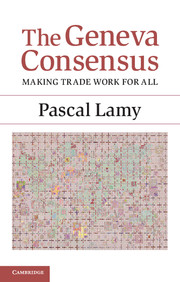Book contents
- Frontmatter
- Contents
- Preface
- 1 Harnessing globalization amid the crisis facing multilateralism
- 2 The changing face of trade
- 3 Helping the poorest up the prosperity ladder
- 4 Trade: friend not foe of the environment
- 5 Trading towards global food security
- 6 Trade can contribute towards better health
- 7 Trade and labour: separated at birth, but still connected
- 8 Trade and energy: the case for a greater WTO role
- 9 Trade and currencies: trading community seeks greater currency stability
- 10 Trade and competition: fairer competition makes for fairer trade
- 11 Trade and human rights: a case of misplaced suspicion
- 12 Corruption: a cancer that trade transparency can help to treat
- 13 Last but not least: the Doha Round
- Epilogue
- Index
3 - Helping the poorest up the prosperity ladder
Published online by Cambridge University Press: 18 December 2013
- Frontmatter
- Contents
- Preface
- 1 Harnessing globalization amid the crisis facing multilateralism
- 2 The changing face of trade
- 3 Helping the poorest up the prosperity ladder
- 4 Trade: friend not foe of the environment
- 5 Trading towards global food security
- 6 Trade can contribute towards better health
- 7 Trade and labour: separated at birth, but still connected
- 8 Trade and energy: the case for a greater WTO role
- 9 Trade and currencies: trading community seeks greater currency stability
- 10 Trade and competition: fairer competition makes for fairer trade
- 11 Trade and human rights: a case of misplaced suspicion
- 12 Corruption: a cancer that trade transparency can help to treat
- 13 Last but not least: the Doha Round
- Epilogue
- Index
Summary
When in 2000 world leaders adopted the Millennium Declaration and its eight Millennium Development Goals (MDGs), they committed themselves to an unprecedented effort to tackle global poverty. The goals, with their 21 targets for development and 60 indicators for measuring progress on halving the incidence of extreme poverty by 2015, became the blueprint for global action to address the development needs of the world’s poorest countries. By creating a stable multilateral trading system, the WTO is at the forefront of efforts to forge an international environment that helps countries to grow and to reduce poverty. It is not surprising, then, that international trade – and by extension the work of the WTO – appears in the MDGs. Trade falls mainly within the targets set in the eighth MDG, which calls for the development of a global partnership for development.
The eighth MDG urges the international community to ‘develop further an open, rule-based, predictable, non-discriminatory trading and financial system’. This system should ensure ‘developing countries gain greater access to the markets of developed countries’ and that ‘least developed countries benefit most from tariff reductions, especially on their agricultural products’. By setting these targets, the international community recognized global trade as an important engine for development and showed awareness of the conditions under which international trade must operate to deliver real economic growth effectively. This closely corresponds to the WTO’s central business of regulating international trade, reducing market access barriers and ensuring a more level playing field for all its members. Furthermore, in keeping with the second target, which addresses the special needs of the least-developed countries (LDCs), the WTO is committed to working towards enhancing the benefits of trade for the poorest of its members.
- Type
- Chapter
- Information
- The Geneva ConsensusMaking Trade Work for All, pp. 37 - 54Publisher: Cambridge University PressPrint publication year: 2013

